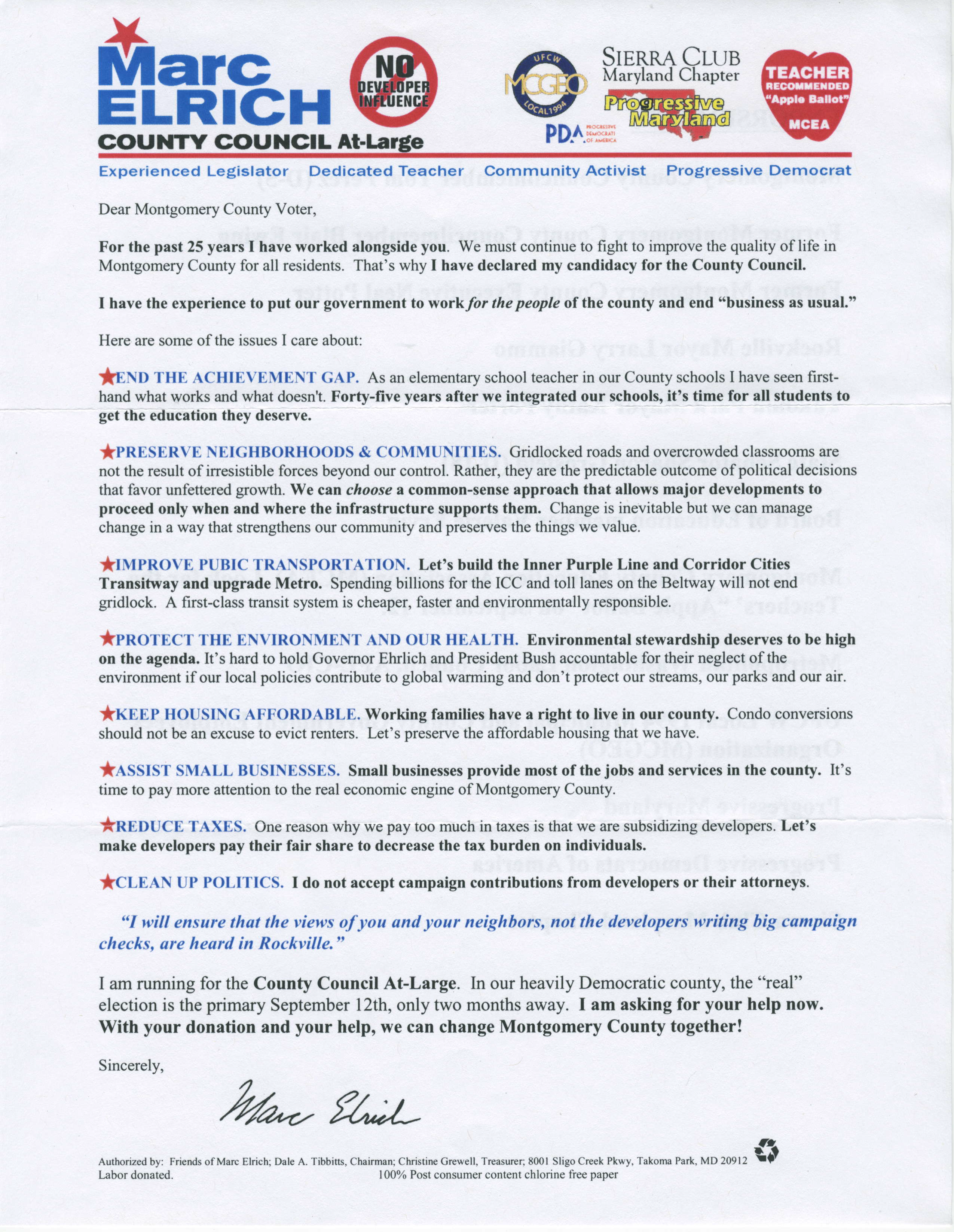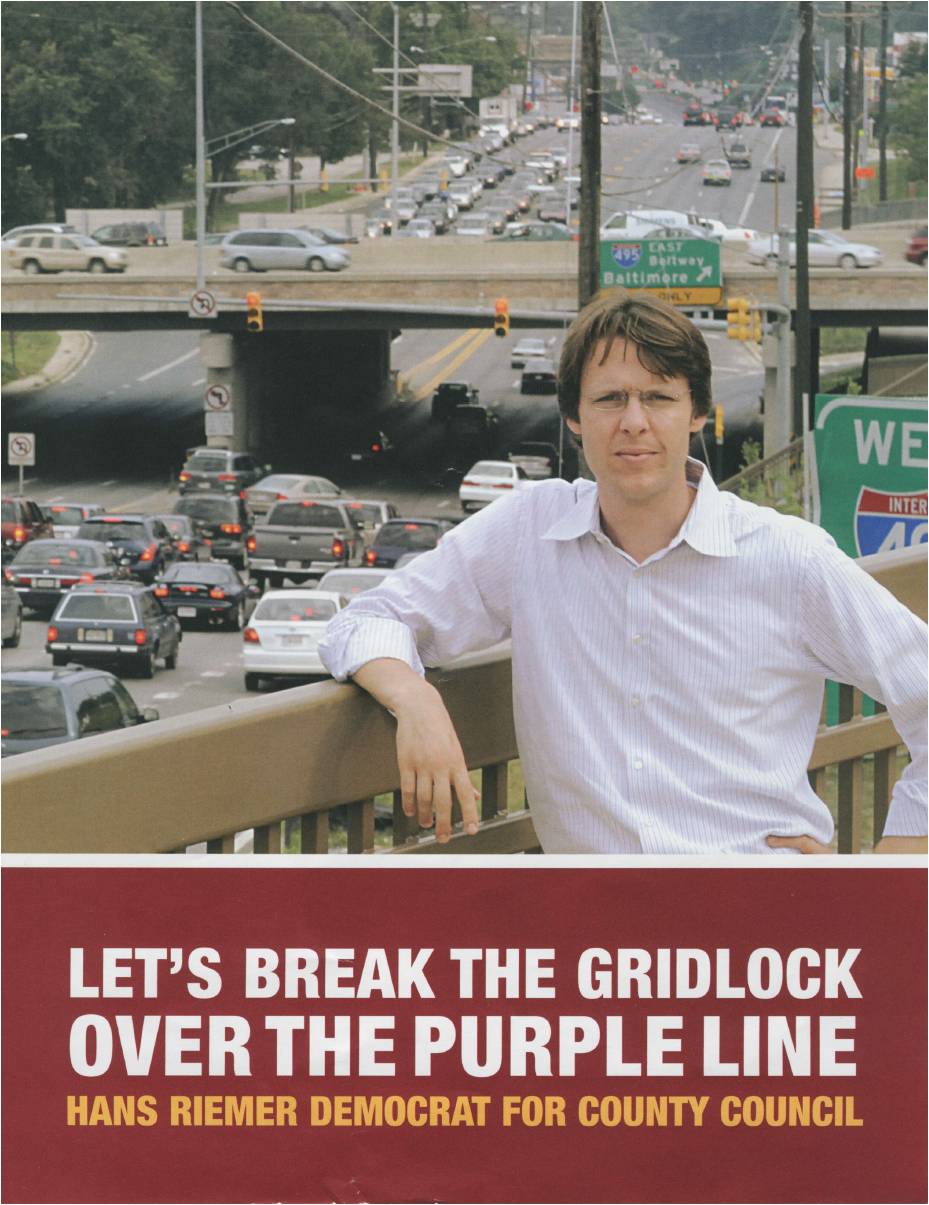By Adam Pagnucco.
The year was 2006. I had lived in Montgomery County for almost three years and knew very little about it. I knew the county executive was Doug Duncan because I had seen him on TV talking about the D.C. sniper attacks. I knew that people were fighting over a proposed highway called the Intercounty Connector, but it was nowhere near my neighborhood so it was not my problem. And I knew that we had good schools because that was a big reason why I moved here. That was about it.
But my then-wife was much more involved. She was on the Wheaton Redevelopment Advisory Committee and they were hosting a community meeting to discuss a new zoning text amendment proposed by County Council Members Marilyn Praisner and Tom Perez. I had no idea what a zoning text amendment was but my wife wanted me to come anyway. So I did, but I was more interested in what scotch I would get at the Royal Mile when the meeting ended than any land use stuff. (Remember that place? I still miss it.)
Then a guy in the back stood up to speak. I don’t remember what he said but I’ll never forget how he said it. The guy knew everything about the council members’ proposal. He seemed to know everything about county development policy. He knew a ton about Wheaton too. Best of all, he could explain it in terms I could understand. I thought to myself, “Wow, this guy is really smart. I should meet him sometime.”
That guy was Marc Elrich.
A couple months later, I was involved in a county election for the first time. My issue was the terrible intersection of Georgia Avenue and Forest Glen Road. The only entrances to the Forest Glen Metro Station were on the opposite side of Georgia from my neighborhood and that intersection is a beast to cross, especially in bad weather and at night. We called it the IOD, for Intersection of Death. I encountered the guy from the Wheaton meeting campaigning for county council at one of the Metro entrances. I told him about my issue and we watched the intersection together for a good 45 minutes. He had grown up in the neighborhood and knew all about it. He remembered when the Beltway was once green space where kids would go to play. He knew tons about that intersection, having seen it expand over the years, and he knew it had to be made safer.
Again, this was Marc Elrich.
Finally, my friend Maida hosted a campaign coffee for Elrich. On her living room table, he used a set of coasters to explain something called project area mobility review. Sure, it was super-complicated, but once again he could explain it in a way that made sense to laypeople. And he had a point: when a new development is built, why shouldn’t we examine its traffic impact across a broader area and not just on a couple adjacent intersections?
That sealed it for me. This Marc Elrich fellow knew a lot, he cared what little people like me thought and if he was on the county council, nobody would push him around. Marc just had to get elected.

Marc’s super detailed letter in the 2006 primary.
Marc was not the only politician I met. My neighbors and I were roaming the county, grabbing every politician we could find to get them to support a new Forest Glen Metro entrance. There was a young guy I met at a Wheaton event who was also running for county council but not in the same race as Marc. I made my pitch to him. Other politicians were quick to make promises and then move on to the next person in the crowd but this young guy didn’t do that. Instead, he listened intently, asked a lot of questions and just a couple weeks later was at the Metro station handing out flyers about the issue.
That guy was Hans Riemer.
Hans was a lot like me. He was about my age and had worked on national issues. (I was a researcher in the labor movement, he had worked to protect social security.) He was married and was thinking about having kids, like me. He was enthusiastic about smart growth and transit projects like the Purple Line. He knew that a growing county needed more housing so more new residents like us could live here. The more time I spent with Hans, I thought, “I really need somebody who is in my stage of life and buys into all the positive things happening here on the county council. All the other council people are old folks who have been here a long time. I want one of them to be like me.” Hans just had to get elected.
So they were my two must haves. And it turned out that they did not like each other.
Marc thought Hans didn’t know enough about the county to deserve being elected. Marc wanted people to pay their dues before running for office. He wanted them to testify at hearings, study master plans, serve on advisory committees, lead civic associations, volunteer at county events and all the rest of it. Few if any people had done more of that than Marc. I didn’t know it at the time, but Marc had already run for county council four times and lost. (That said, he had been on the Takoma Park City Council for almost 20 years.) Hans had bought a house in the county in 2004 and started running for office months later. Again, I didn’t know this, but for a short period Marc and Hans had run against each other for the same seat before Marc shifted to the at-large race. None of this sat well with Marc. He wanted me to vote for Hans’s opponent, Valerie Ervin.
As for Hans, he was less vocal than Marc, but I could tell that he wasn’t crazy about him. For a guy like Hans (or me for that matter), all of this paying dues stuff was a way to shut out young people or anyone else who did not fit in with the old guard who had been running the county. He also didn’t like Marc’s skepticism of development projects. How was it progressive to oppose housing and jobs for new people? He didn’t come right out and say it – at least not back then – but Hans didn’t regard Marc as a real progressive.
The bottom line is that each of them viewed the other one as a phony.

Hans standing a few blocks from my old house in his 2006 mailer.
I didn’t care what they thought. I liked both of them and I stuffed their lit in every door in my neighborhood. (Being new to politics, I didn’t think to hit only the Democratic doors!) Both of them finished first in my precinct, but Marc won his race and Hans did not. Four years later, Hans was elected at-large and I went to work for him. But that’s another story.
I was new to county politics back then, but right away I began to learn something about how things work around here: disagreements get magnified and areas of agreement get minimized. For all their differences in personality and on issues like development, Marc and Hans agreed at least 80% of the time. That’s why I could support both of them. But factional politics pull people apart even when they’re in the same party and opposing camps form. Throw in political ambition and personal animosity and this was the start of a real rivalry.
The Marc vs Hans conflict would wind up going down in MoCo history as one of the county’s greatest political feuds, right there with Sidney Kramer vs David Scull, Doug Duncan vs Blair Ewing and Dana Dembrow vs the rest of the District 20 delegation. And just like those other feuds, this one was going to get settled in an election.
I’ll have more on that election in Part Two.
